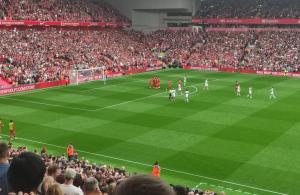The Mental Health Implications of the David Coote Controversy on Liverpool, Jürgen Klopp and the City’s People
For a city like Liverpool, the team is more than just a club—it’s a source of identity, pride, and collective strength”
LIVERPOOL, UNITED KINGDOM, November 12, 2024 /EINPresswire.com/ -- Liverpool FC, Refereeing Controversies, and the Psychological Impact on the Club and Its Supporters.— Dr.Shamender Talwar
Dr. Shamender Talwar, a globally renowned social psychologist based in Liverpool, UK, has expressed profound concern over the psychological toll that ongoing refereeing controversies are having on Liverpool Football Club, its fans, and the wider Liverpool community. This statement comes on the heels of Premier League referee David Coote’s suspension after a video surfaced allegedly showing him making derogatory remarks about Liverpool FC and its former manager, Jürgen Klopp. Coote is now under investigation by PGMOL. He has admitted the video is genuine.
The video, which was widely shared on social media, reportedly shows Coote, 42, referring to a match between Liverpool and Burnley in 2020, where Klopp had publicly criticized Coote for failing to penalize challenges on Liverpool players. In the video, Coote allegedly refers to Klopp as "arrogant" and uses expletives when discussing him, further raising questions about potential bias within officiating. While pending a full investigation, Coote's suspension highlights the ongoing concerns regarding transparency and fairness in Premier League officiating.
Dr. Talwar emphasizes that incidents like these are not just sporting disputes; they are creating a psychological burden on both the players and the supporters of Liverpool FC. For Liverpool, football is not just a sport; it’s a powerful part of the city's identity. The sense of community and pride built around the club extends far beyond the pitch and into the very fabric of the city.
The fans, whose emotional investment in the team is intense, are particularly vulnerable to the mental health effects of perceived injustice. This is amplified by ongoing controversial decisions, such as the infamous Merseyside derby in 2020, where Coote, officiating the VAR, failed to penalize Everton’s Jordan Pickford for a reckless tackle on Virgil van Dijk, resulting in a season-ending injury for the player. Along with other contentious decisions, including the unpunished Martin Ødegaard handball during a Liverpool-Arsenal match last season, these instances have compounded a feeling of unfair treatment, leading to frustration, anger, and distrust.
Klopp’s own mental and emotional well-being had also been tested in this atmosphere of perceived injustice. As the manager, his role went beyond coaching; as he represented the voice of both the team and its supporters. Klopp has continually spoken out about these controversial decisions, and his frustration is a reflection of the broader distress felt by the club’s fanbase. "We were angry with the referee but we have to criticize ourselves first for not finishing the game," Klopp stated after the Burnley match, showcasing the mental resilience he tries to instill in his team while coping with external frustrations.
Dr. Talwar further explains that this ongoing tension is undermining the psychological resilience of both players and fans. "For a city like Liverpool, the team is more than just a club—it’s a source of identity, pride, and collective strength," he explained. "When the integrity of the game is questioned, it affects not only the players' performance but the mental well-being of the entire community. Fans who feel consistently betrayed by officiating can experience heightened levels of stress, anxiety, and depression."
The psychological impact of these controversies is especially significant for Liverpool's passionate fanbase, which spans across generations and connects deeply to the city’s cultural and social fabric. The ongoing sense of injustice is not just alienating fans; it is eroding the trust that is essential for fostering a healthy relationship between supporters, the club, and the broader footballing world. Dr. Talwar calls for a deeper consideration of mental health in the structure of football's governing bodies, particularly in officiating decisions and their effects on supporters.
However, amidst this turbulence, with the appointment of Arne Slot as the new manager of Liverpool, the club finds itself in a position to reap the rewards of the foundation laid by Klopp. Slot's Liverpool sits atop both the Premier League and the Champions League. Dr. Talwar believes that Slot’s success will be in part due to the mental fortitude and tactical groundwork established by Klopp and his backroom staff over the past years.
The transition from Jürgen Klopp to Arne Slot mirrors the legacy of great Liverpool FC managerial shifts, reminiscent of the transitions from Bill Shankly to Bob Paisley. In the 21st century, Klopp’s departure and Slot’s appointment represent a new era of continuity and innovation, just as Shankly’s groundwork laid the foundation for Paisley’s dominance. This evolution not only respects the club’s storied history but also sets a new standard for success in modern football, ensuring that Liverpool FC remains at the forefront of the game. This transition could potentially be even more successful than previous ones. While the shifts from Shankly to Paisley were monumental, the move from Klopp to Slot brings a fresh dimension to Liverpool FC's leadership. Slot’s calm and strategic approach, coupled with Klopp’s transformative legacy, positions the club to achieve even greater success in the 21st century. This evolution blends the best of tradition with modern innovation, ensuring that Liverpool FC continues to thrive, both in terms of footballing success and cultural impact.
Klopp’s legacy at Liverpool is marked not only by triumphs on the pitch but also by his ability to manage the psychological pressures that came with the club’s rise to the top, including dealing with the controversy surrounding referee decisions. The sweat and blood Klopp and his team invested in overcoming these challenges will continue to benefit the team under Slot’s calmer approach. The future of Liverpool FC looks brighter than ever, and the club’s ability to rise above adversity is a testament to the mental resilience of its players, fans, and the city itself.
About Dr. Shamender Talwar PhD FRSA
A globally-renowned social psychologist, co-founder of The Unity of Faiths Foundation (TUFF Earth), and a prominent advocate for social change, unity, and environmental responsibility. His work combines the psychological insights of Freud and Jung with modern-day challenges, focusing on fostering global cohesion, kindness, and mental health initiatives. Dr. Talwar has supported governments and organizations worldwide, introducing programs that promote education in human values, youth engagement, and community cohesion. He has been recognized for his contributions to social psychology and community development.
Daniel Xander Roberts
TUFF USA
email us here
Legal Disclaimer:
EIN Presswire provides this news content "as is" without warranty of any kind. We do not accept any responsibility or liability for the accuracy, content, images, videos, licenses, completeness, legality, or reliability of the information contained in this article. If you have any complaints or copyright issues related to this article, kindly contact the author above.



